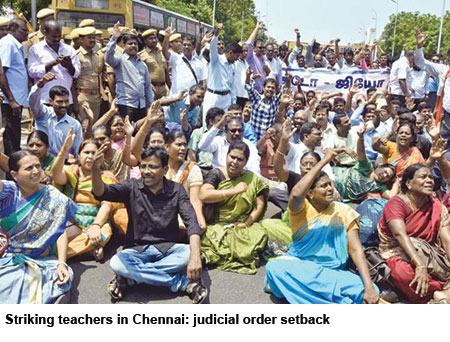Tamil Nadu: Patience erosion
 A long-standing proposal of the incumbent E.K. Palaniswamy-led All India Anna Dravida Munnetra Kazhagam (AIADMK) government to introduce the Aadhar-enabled biometric attendance system (AEBAS) for over 390,000 teachers and administrative staff of Tamil Nadu’s 57,000 government and aided schools has been stymied for nearly two years because of stiff opposition from teachers. This despite an official government order (GO) issued on October 28, 2018 making AEBAS mandatory for teachers and staff of 7,726 government and government-aided high and higher secondary schools in the first phase.
A long-standing proposal of the incumbent E.K. Palaniswamy-led All India Anna Dravida Munnetra Kazhagam (AIADMK) government to introduce the Aadhar-enabled biometric attendance system (AEBAS) for over 390,000 teachers and administrative staff of Tamil Nadu’s 57,000 government and aided schools has been stymied for nearly two years because of stiff opposition from teachers. This despite an official government order (GO) issued on October 28, 2018 making AEBAS mandatory for teachers and staff of 7,726 government and government-aided high and higher secondary schools in the first phase.
But on April 15, the Madras high court dismissed a writ petition filed by government high school teacher R. Annal, challenging its implementation. The petition challenged the GO of October 28, 2018 on the ground that it is unconstitutional, violative of the Aadhar Act, 2016 and contrary to the Supreme Court’s verdict in Justice K.S. Puttaswamy vs Union of India (2018) which limited government insistence on usage of the Aadhar card for government-citizen transactions. Petitioner Annal argued that since she did not have an Aadhar card, forcing her to use the biometric attendance system would be violative of her right to privacy.
Rejecting her plea, Justice S.M. Subramaniam said the petitioner could either abide by service rules or quit public service, and directed the AIADMK government to implement AEBAS in all schools. Coming down heavily on government school teachers for indiscipline, laxity and inefficiency, he further directed the state government to verify movable and immovable assets owned by teachers and staff of government and aided schools against income tax declarations made by them, and ensure that rules are amended to make merit-cum-seniority the norm for promotion of teachers.
Education ministry officials say the decision to introduce phased AEBAS in all government and aided schools was prompted by frequent complaints of teacher absenteeism and attendance by proxy, especially in rural government schools. A spate of teachers’ strikes last year and a massive nine-day strike on January 22 called by the Joint Action Council of Tamil Nadu Teachers Organisation and Government Employees Organisation (JACTO-GEO), could also be an underlying reason for the AIADMK government to enforce introduction of AEBAS.
Although primary school teachers unions have been resisting introduction of AEBAS in government primaries, teachers in high and higher secondary schools have welcomed AEBAS on the ground that truant teachers have given the teaching profession a bad name. “Nowadays, due to strict monitoring by education officials, teacher absenteeism has been sharply reduced. Poor public transport and frequent imposition of non-academic administrative tasks upon primary teachers eats into teaching hours and diverts their focus from teaching. The education ministry’s insistence on teachers attending repetitive and ineffective teacher training workshops is also a contributory cause of teacher disinterest and absenteeism,” says a government high school headmistress who requested anonymity.
Curiously, two study reports on teacher absenteeism present contradictory findings. The Economic Survey (2016-17), an annual pre-budget document tabled by the Union ministry of finance, cited teacher absenteeism and shortage of professionally qualified teachers as the main reasons for low-quality primary education, and added that biometric attendance of teachers should be accompanied by evaluation of student learning outcomes. On the other hand, a March 2017 study conducted by the Bangalore-based Azim Premji Foundation, which surveyed 619 schools and 2,861 teachers in six states — Chhattisgarh, Rajasthan, Uttarakhand, Bihar, Karnataka and Madhya Pradesh — concluded that teacher absenteeism in government schools without legitimate reason is a mere 2.5 percent, and was prompted by systemic challenges including administrative tasks heaped upon them by state governments and mandatory attendance of training sessions. The Premji Foundation’s study observed that the average teacher is a committed professional working under difficult circumstances.
Both these studies make valid points that the Tamil Nadu government would do well to heed. According to the Annual Status of Education Report (ASER) 2018 released in Delhi on January 15, 60 percent of class V and 28 percent of class VIII children cannot read class II textbooks. Worse, 75 percent of class V and 50 percent of class VIII students in Tamil Nadu’s rural government schools cannot solve simple division sums. Now with the Madras high court backing the government order making AEBAS compulsory in all government schools, quite obviously official and public patience with the non-performing teachers community is wearing thin.
Hemalatha Raghupathi (Coimbatore)















Add comment